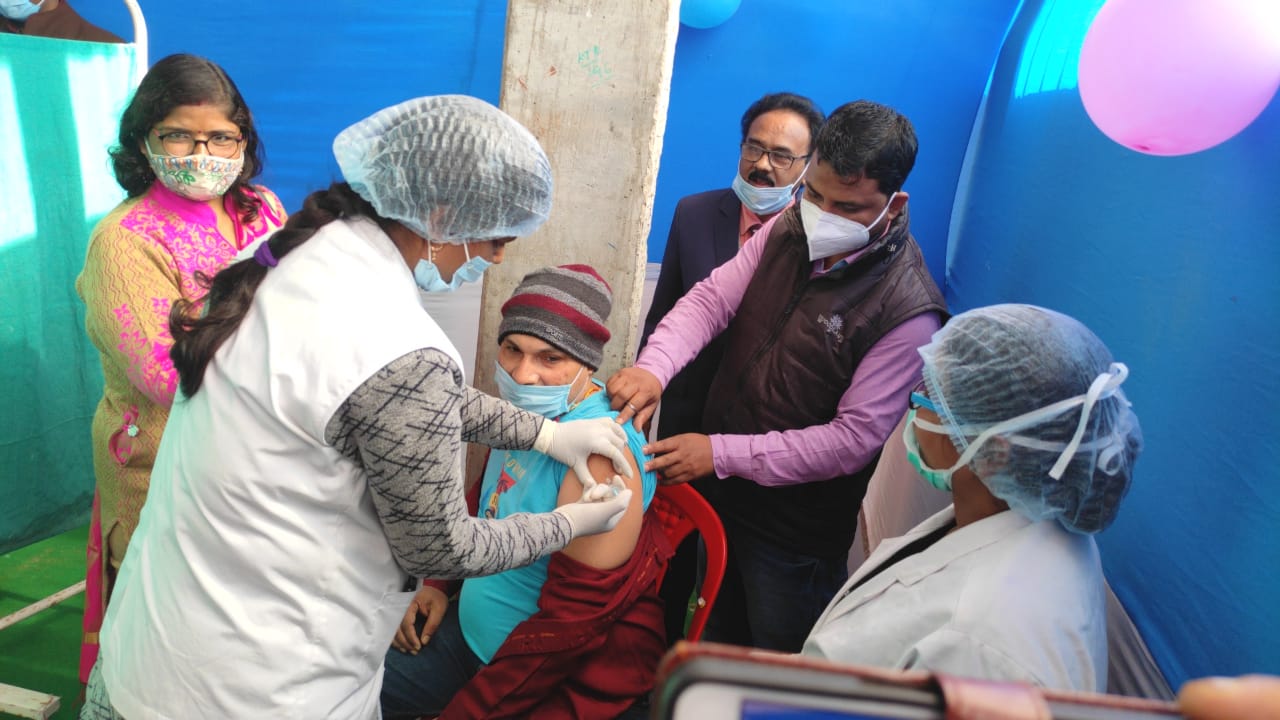Following the death on December 21 last year of a volunteer, nine days after a trial dose of Bharat Biotech’s Covaxin, other volunteers have raised questions on the way in which the trial was conducted and the behaviour of People’s Hospital, Bhopal, Madhya Pradesh, when they approached it with following post-vaccine complications. Many faced issues such as headaches, dizziness, loss of appetite, vomiting, backache, breathlessness and abdominal pain, they said.
“One day, a van came to our colony blaring the promise, ‘Get vaccinated for COVID-19 and take home seven hundred and fifty rupees’. We went to the hospital where a check-up was done, an injection was given and we were sent home. On the third day, I developed a severe cold and became breathless. I lost my appetite and could not go to work,” Man Singh Parmar, a 70-year-old volunteer in the Covaxin trial in Bhopal, said.
Rachna Dhingra, a social activist associated with the Bhopal Group for Information and Action, recently interacted with the media through video conferencing, along with volunteers from the trial. Dhingra alleged the vaccine trials included survivors of the 1984 Bhopal gas tragedy, who were already unwell. They were not informed about the vaccine trials; they were merely told they would not get COVID-19. Since most of them were uneducated and in low-paying jobs, they were lured with the offer of Rs 750 for vaccination.
The volunteers say there was no agreement or consent form signed, and all they were given was a booklet in which they were told to mention side effects, if any. “No paper was given, we were simply given the promised money in cash,” Parmar said in the video conference.
According to Dhingra, more than 600 economically underprivileged and uneducated people from several localities around the hospital such as Garib Nagar, Shankar Nagar, Oriya Basti, Kainchi Chola and JP Nagar were taken in for trial doses of Covaxin without proper information. When many of the volunteers faced health issues, they were not provided treatment by the hospital.
Jitendra, 38, is a father of two and works as a machine operator, earning Rs 300 a day. It’s been a week since he has been in hospital, following post-vaccine complications. His mother Gulab Bai levelled serious charges against the hospital administration.
“My son was absolutely healthy before he took the injection. Then, on December 14, he developed a cold and cough, vomiting, weakness… He has not been able to go to work since then. When we approached the hospital, the doctor prescribed medicine but they did not admit him even though he was very ill. Only after a video of his was put out online did they admit him,” Bai said.
Meanwhile, Rashida Bi, chairperson of the Bhopal Gas Victim Mahila Stationery Employees Association said that of the 1,700 volunteers, at least 700 were roped in without being provided proper information. This is not without precedent. “No one has been punished for the deaths of thirteen gas tragedy survivors about twelve years ago during the trial by pharma companies at the Bhopal Memorial Hospital and Research Centre,” she reminded.
To ensure such a tragedy is not repeated, all organisations associated with the Bhopal gas tragedy survivors and victims have written to Prime Minister Narendra Modi and Union health minister Harsh Vardhan demanding that the trial of Covaxin in Bhopal be stopped immediately. “We have also demanded a compensation of fifty lakh rupees for the family of the person who passed away after the trial dose,” Bi added.
Shahzadi (60), Chanda Devi (60), Chhotu Das (32), Jasoda Bai (35), Mohan Saav (57) and Ratan Lal (65), who were all part of the trail, told media that they had problems post-vaccination, and alleged they were neither given any consent letter by the hospital nor received medical treatment thereafter.
Bioethics researcher Anant Bhaan has raised several questions on the Covaxin trials in Bhopal. During the video conference, he said: “The most important thing is that these volunteers were neither given a copy of the memorandum of understanding nor given post-vaccination medical care. The Indian Council of Medical Research guidelines stipulate that audio and video recordings should also be done of the volunteers. This too has not been done, and is a major violation of the rules.”
When a small clinical trial has created so many issues, what would happen with trials on a large scale, Bhan asked. “The fact that we are resorting to shortcuts is problematic. Transparency about the vaccine is very important so that people’s trust can be won. Safety is very important,” he emphasised.
Meanwhile, amidst controversy, on January 7, Bharat Biotech announced the successful completion of the enlisting for the third phase trial of Covaxin — 25,800 people have been enrolled.
The Indian government kicks off its COVID-19 vaccination drive from January 16, having procured 11 million doses of Covishield vaccine from Pune-based Serum Institute of India at a cost of Rs 200 per dose (excluding taxes). Another 5.5 million doses of Covaxin are being procured from Bharat Biotech International Ltd (BBIL). Of these 5.5 million doses, the company is offering 1.65 million doses free of cost to the government, while the remaining 3.85 million doses of Covaxin are being procured at a cost of Rs 295 per dose (excluding taxes).


















